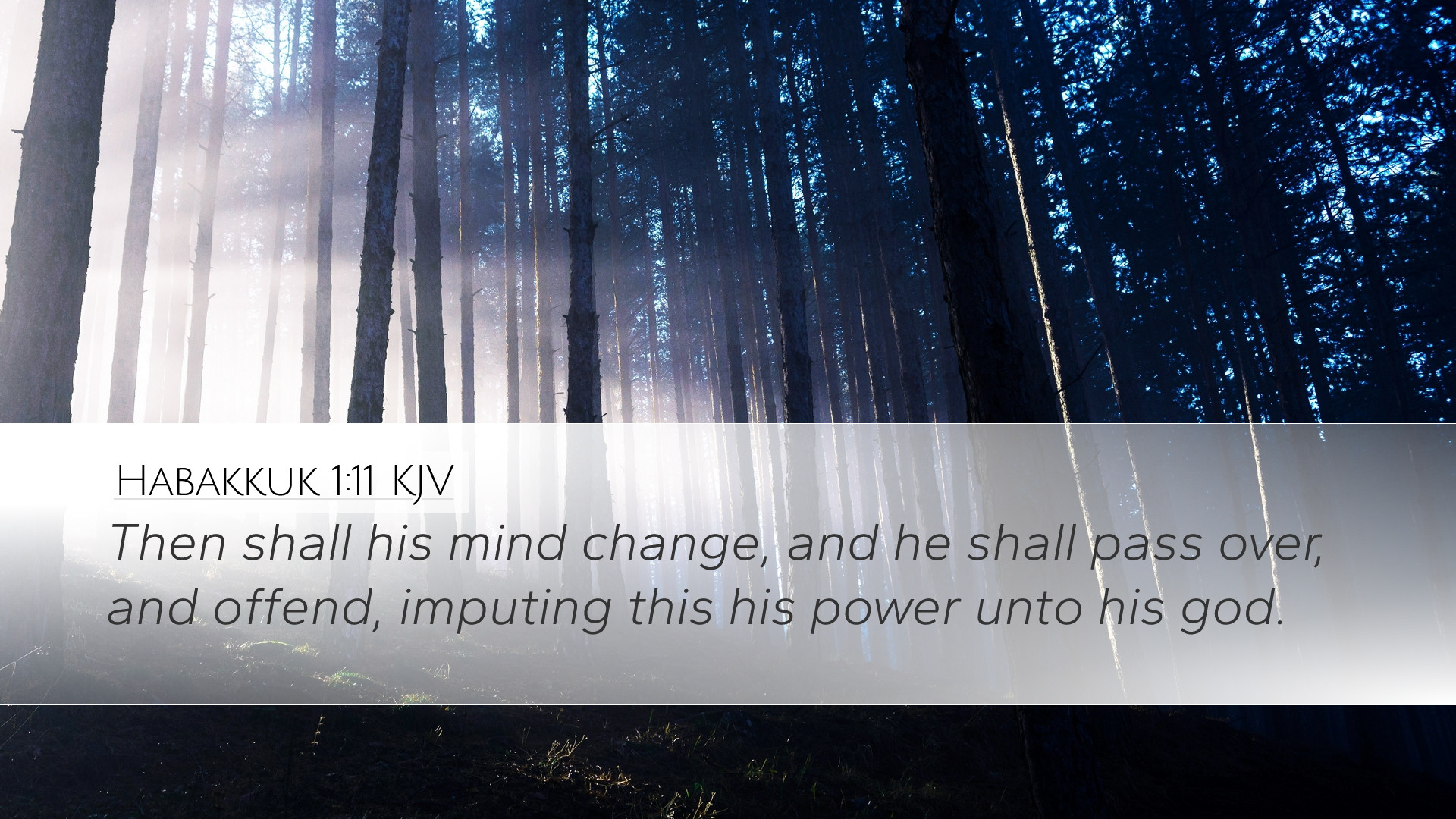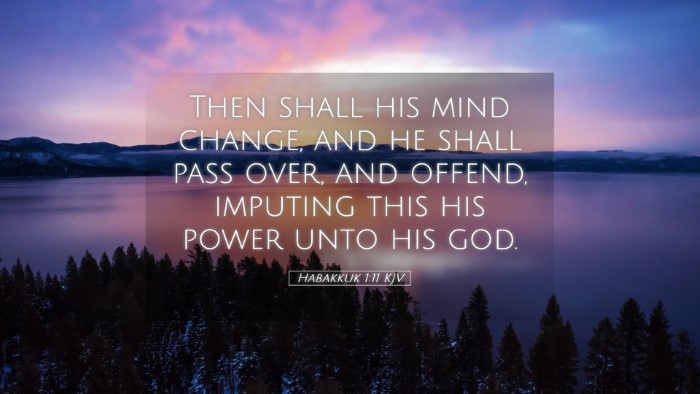Old Testament
Genesis Exodus Leviticus Numbers Deuteronomy Joshua Judges Ruth 1 Samuel 2 Samuel 1 Kings 2 Kings 1 Chronicles 2 Chronicles Ezra Nehemiah Esther Job Psalms Proverbs Ecclesiastes Song of Solomon Isaiah Jeremiah Lamentations Ezekiel Daniel Hosea Joel Amos Obadiah Jonah Micah Nahum Habakkuk Zephaniah Haggai Zechariah MalachiHabakkuk 1:11
Habakkuk 1:11 KJV
Then shall his mind change, and he shall pass over, and offend, imputing this his power unto his god.
Habakkuk 1:11 Bible Commentary
Commentary on Habakkuk 1:11
The verse in question, Habakkuk 1:11, reads:
"Then they sweep by like the wind and go on, guilty men, whose own might is their god!" (ESV)
Introduction
Habakkuk is a unique book within the prophetic literature of the Old Testament, dealing primarily with the prophet's dialogue with God regarding the impending judgment of Judah and the role of the Chaldeans (Babylonians). This verse encapsulates the essence of God's judgment against the wickedness of Israel while highlighting the character of the Chaldeans.
Contextual Background
The Book of Habakkuk is set against the backdrop of a time of moral decay and impending foreign invasion. It serves as a conversation between the prophet and God, where Habakkuk wrestles with the justice of God in light of human injustice. In Habakkuk 1:11, the focus shifts toward the Babylonians, emphasizing their arrogance and reliance on their own power.
Insights from Matthew Henry
Matthew Henry notes that Habakkuk's prophecy serves as a reminder of divine sovereignty over nations. He argues that the Babylonians, despite their military might, are no more than instruments in God’s hands. In this verse, Henry sees a portrayal of their swiftness and destructiveness, likening them to the wind—uncontrollable yet directed by divine providence.
Henry emphasizes the spiritual condition of these "guilty men," illustrating that their strength has become their god. This highlights a fundamental biblical theme: reliance on human strength instead of divine assistance leads to moral downfall. The connection between pride and idolatry is clear, as they worship their own power.
Insights from Albert Barnes
Albert Barnes provides a more detailed analysis of the terms used in Habakkuk 1:11. He points out that the use of "sweeping by like the wind" conveys a sense of inevitability and unstoppable force. Barnes suggests that this image reflects the sudden and overwhelming might of the Chaldeans as they conquer and devastate nations.
Furthermore, Barnes highlights the phrase "whose own might is their god," emphasizing the idolization of power. He notes that the Babylonians exemplify the folly of idolatry, not just in a physical sense but also in a spiritual sense. They have replaced reliance on God with confidence in their military prowess—a theme prevalent throughout the scriptures.
Insights from Adam Clarke
Adam Clarke offers a more practical application of Habakkuk 1:11 for contemporary believers. He interprets the Babylonians' reliance on their strength as a warning to modern societies that place their trust in human power, military might, or economic strength. Clarke challenges readers to reflect on where their own trust lies and the dangers of self-reliance.
Clarke’s commentary also reflects on the cyclical nature of human history where nations, in their pride, often fall victim to the very arrogance they embrace. He points out that just as the Chaldeans will eventually meet their demise, so too will any nation that disregards God's sovereignty.
Theological Implications
One of the key theological points drawn from Habakkuk 1:11 revolves around the nature of God’s sovereignty. The text presents a dichotomy between human strength and divine authority. Here, God is portrayed as the ultimate ruler, allowing nations to rise and fall according to His will.
This verse also provides a critical reflection for theological discourse on theodicy, as it raises questions about the existence of evil and the justice of God. The Babylonians personify evil, yet God employs them as a tool for His purposes. This paradox invites further exploration into the nature of divine justice, mercy, and human agency.
Practical Applications
- Humility in Leadership: Leaders should recognize that their strength and success come from God, not their own abilities.
- Dependence on Divine Strength: In a culture that often idolizes self-sufficiency, believers are called to depend on God's power for their strength.
- Caution Against Complacency: The rise and fall of nations serve as reminders to remain vigilant in faith and righteousness.
- Understanding God's Use of Evil: Believers are encouraged to find peace in the understanding that God can use even wickedness for a greater purpose.
Conclusion
Habakkuk 1:11 serves as a powerful reminder of the transitory nature of human strength and the folly of self-idolization. By examining this verse through the lenses of Matthew Henry, Albert Barnes, and Adam Clarke, we uncover a rich tapestry of themes that resonate through time, inviting pastors, students, theologians, and scholars to engage deeply with scripture's profound insights on power, pride, reliance, and the nature of God.


